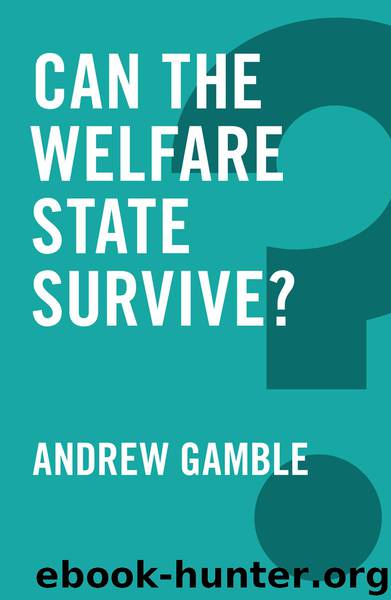Can the Welfare State Survive? by Andrew Gamble

Author:Andrew Gamble
Language: eng
Format: epub
ISBN: 9780745698779
Publisher: Wiley
Published: 2016-04-19T00:00:00+00:00
International competitiveness
The second key challenge facing contemporary welfare states and governments seeking to manage them is how to maintain a welfare state in an open economy. After several decades in the twentieth century when international monetary cooperation collapsed, trade stagnated or shrunk, and protectionism in all its forms advanced, the period since 1945 saw a gradual opening of the international economy once again, with the establishment of a new international monetary order, and steady efforts to liberalize the movement of goods, capital, and even people. After the 1970s and the neo-liberal turn executed by the United States and the United Kingdom, the pace of opening quickened. The new monetary and fiscal rules developed to counter inflation were accompanied by the steady abandonment of capital controls, the floating of currencies, the opening of borders, and the freeing of trade. These trends were enhanced by the end of the Cold War and the division of the world into two separate economic and military blocs.
The new opening acquired a new name, globalization, and although the claims for it were often exaggerated, it did represent a marked shift from the earlier post-war period, and still more from the inter-war period and the world wars themselves. This was much more like a return to the liberal international order over which Britain had presided in the nineteenth century. One important difference was that there were no colonial empires left. The new phenomenon since the 1990s has been the emergence of a group of rising powers, among them China, India, and Brazil. These powers with their vast populations began to grow rapidly, transforming the nature of the international economy, its division of labour, and the prospects for its future governance. These developments suggested that during the twenty-first century there would be a significant change in the balance of the international economy, with much greater weight and political power accruing to the rising powers.
The remarkable progress of the rising powers was a key factor in the long economic upswing which began in the 1990s and lasted, with some interruptions, until the financial crash of 2008. The rising powers contributed low-cost manufactures which now flooded the markets of the Western economies, lowering inflation and boosting living standards. But what they also did was raise anxieties about where the process would stop. In the new division of labour of the international economy, how would the Western economies readjust to survive? As more and more manufacturing and service jobs were outsourced to the rising powers, many worried that it would be hard to find replacement jobs for the workers who were displaced. If jobs could not be found for them, many might become dependent on welfare benefits, requiring an increase in spending and therefore a further shortfall in resources to pay for it.
The Western economies seemed to be caught in a bind. It was difficult to reverse globalization and the liberalization of the international economy with which it was associated. But if the wages and labour standards in the rising powers
Download
This site does not store any files on its server. We only index and link to content provided by other sites. Please contact the content providers to delete copyright contents if any and email us, we'll remove relevant links or contents immediately.
The Secret History by Donna Tartt(16607)
The Social Justice Warrior Handbook by Lisa De Pasquale(11485)
Thirteen Reasons Why by Jay Asher(7781)
This Is How You Lose Her by Junot Diaz(5753)
Weapons of Math Destruction by Cathy O'Neil(5029)
Zero to One by Peter Thiel(4816)
The Myth of the Strong Leader by Archie Brown(4785)
Promise Me, Dad by Joe Biden(4440)
Stone's Rules by Roger Stone(4412)
Beartown by Fredrik Backman(4403)
How Democracies Die by Steven Levitsky & Daniel Ziblatt(4392)
The Fire Next Time by James Baldwin(4336)
100 Deadly Skills by Clint Emerson(4070)
A Higher Loyalty: Truth, Lies, and Leadership by James Comey(4024)
Rise and Kill First by Ronen Bergman(4008)
The David Icke Guide to the Global Conspiracy (and how to end it) by David Icke(3875)
The Farm by Tom Rob Smith(3869)
Secrecy World by Jake Bernstein(3773)
The Doomsday Machine by Daniel Ellsberg(3725)
